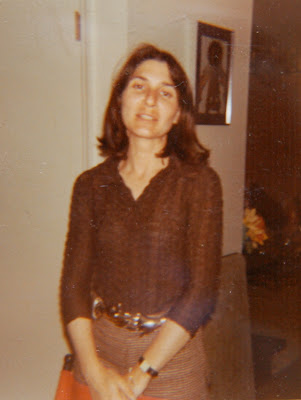
Geraldine Ferraro (1935-2011)
Dear George,
We were saddened last week when we learned that Geraldine Ferraro had died at age 75. For many of my students she was probably a footnote in history, but for our generation she was a living, breathing vital figure in late twentieth century American politics. She ran, of course, as the vice-presidential nominee with Walter Mondale in the 1984 election against incumbents Ronald Reagan and George H. W. Bush. Ferraro’s V.P. nomination, the first for a woman in U.S. history, represented the culmination of two decades of work by the Women’s Liberation Movement, and Katja and I saw her as an outstanding politician: bright, articulate, assertive, knowledgeable.
We were in our forties in 1984 and had seen monumental changes in American society during our lifetimes. Menominee in the 1940’s and 50’s, when I was growing up, was a small town in a conservative, isolated region. While my parents and their friends were undoubtedly enlightened compared to the community at large, traditional gender stereotypes and discrimination were the rule of the day. My paternal grandmother had been state chairperson of the Wisconsin Republican Party, and my dad and mom were staunch conservatives. In our North Woods world, men were “manly men”, women their helpmates, and there were no questions about who was head of the household. Few women in my parents’ friendship group worked outside the home; families were larger than nowadays; and the sexes had a traditional division of labor. I do believe that the adult women and men that I knew as a kid respected and delighted in one another, but males and masculine values clearly enjoyed higher esteem by all concerned.
While I don’t really know for sure, I’d bet that I was the only high school student from the U.P. to ever attend Antioch College. I discovered from the first day of freshman orientation that I was naïve and backwards politically and culturally compared to my more cosmopolitan classmates, many of whom came from left-wing families in East coast metro areas. I recall listening to some of my new classmates discussing the pros and cons of socialism. I had heard vaguely of socialism, but I had it confused with “social diseases”, and I couldn’t imagine what some of my peers found so appealing about syphilis and gonorrhea.
Racial issues were beginning to come to the forefront of societal debate in the late 1950’s, and some of the first civil rights picketing in the nation was done at Yellow Springs’ segregated barber shop. My hallmates and I patronized the black barber shop at the edge of the town’s business district as our mild form of protest. Katja was a member of the local NAACP and more sophisticated about political matters than I. When we talked about gender roles, she argued vehemently for women having lifelong careers, while I tended to dwell on the supposed rewards of motherhood. Katja’s opinions, of course, eventually held sway.
We married in 1960 and went off to graduate school at Michigan. Pharmaceutical companies had just completed their trial tests in Puerto Rico of birth control pills, a revolutionary new breakthrough, and Ann Arbor had been selected as the first site in the U.S. for testing on the mainland. Katja was in the initial group of enlistees, and I used to accompany her to her monthly exams at a second floor office suite on a darkened block of Liberty St. between campus and downtown. She joined Planned Parenthood and then became a charter member of N.O.W. when it was launched in 1966.

Katja L. (1972)
By the time we were living in Cincinnati in the early 1970’s, the Women’s Liberation Movement had gained substantial momentum. Katja was a T.A. in the French department at the University, and she formed a women’s consciousness-raising group composed of friends and colleagues. Soon afterwards she began to notice that whenever she called her friend Ellin both of them would hear a strange clicking sound on the telephone when they first connected. Katja called Bell Telephone to complain about wiretapping, but Bell claimed they would never do that without informing their customers. It was the midst of the Nixon years, and we both felt that wiretapping of a feminist group leader was a distinct possibility. Our phone conversations became less spontaneous.
Katja’s women’s group rotated among the members’ homes, and, over time, I got to know each of the participants, at least superficially. After a few months I got the distinct sense that people were giving me unpleasant looks when I passed in the hallway. I asked Katja what their consciousness-raising discussions were about, and she said they were about individuals’ personal lives. I wondered whether this might include their husbands, but I didn’t pursue the question. The only thing I know for sure is that every group member got divorced in the next two to three years except Katja. She claimed it was because we had the most solid marriage, but I think it was mostly luck.
I wish Geraldine Ferraro or her surrogates were still around today. Sarah Palin and Michele Bachmann seem to be sharing the limelight as women politicians, and, despite Palin giving public credit to Ferraro for paving the way, they are fraudulent imitations. Gender politics, of course, have come a long way since 1950. But they seem to still have a long way to go.
Love,
Dave
G-Mail Comments
Jennifer M (3-30): This is great. I didn't know about Katja's and your roles in the "rights" movements. Thinking back on the goals of the women's movement, Sarah Palin and Michelle Bachman are put in new light.









































































































































































No comments:
Post a Comment